The evidence for a ketogenic diet to fight cancer is undeniable and becoming overwhelming.
The evidence for a whole foods, plant-based diet to fight cancer is also pretty darn compelling.
Media and vocal proponents from both sides would lead you to believe you must choose one or the other but the truth is that a whole-foods, plant-based diet and therapeutic keto have more in common than they have differences and can be combined to take advantage of all the benefits.
When I was first diagnosed with stage 4, terminal lung cancer in 2018, I know I didn’t want to ignore any evidence-based therapeutic options. While pharmaceutical drugs saved my life in those early touch-and-go days, I absolutely credit my whole foods, plant-based way-of-eating – along with therapeutic fasting – with achieving complete remission a year later.
I was lucky (?) to have a strong background in “dieting” and was familiar with all the myriad flavors out there. I’d tinkered with and developed recipes for keto, vegan, paleo, gluten-free, anti-inflammatory, protein-fasting, vegetarian, pescatarian, flexatarian, and whole30 diets. When I heard keto could stop and reverse cancer growth, I knew just what to do. I’ve since tried to share this knowledge with others I realize not everyone has the same background.
So for once, instead of just writing theory, I’ve put together an actionable guide on how exactly to start “keto for cancer” – and notes on how you can do so while still taking advantage of the healing benefits of a whole foods, plant-based diet.
Important Reminder: Keto is not effective for all types of cancer and can be harmful for some (such as renal cancer). The decision to treat your cancer with ketosis should be made in partnership with your health care team based on your particular cancer and personal fitness.
This guide is comprehensive. And so it is long. I’ve divided it into multiple parts to make it easier to navigate:
- Quick Refresher: What is Ketosis?
- The Difference Between Strict Therapeutic Ketosis vs Standard Nutritional Ketosis
- Myths and Concerns Before Starting Keto for Cancer
- The 3 Things You Need to Start Therapeutic Keto for Cancer
- The First 3 Steps to Start Therapeutic Keto for Cancer
Next steps:
- Workflows that Work: Planning and tracking meals and GKI for optimal therapeutic ketosis
- What to eat on a therapeutic whole food, plant-based, ketogenic diet
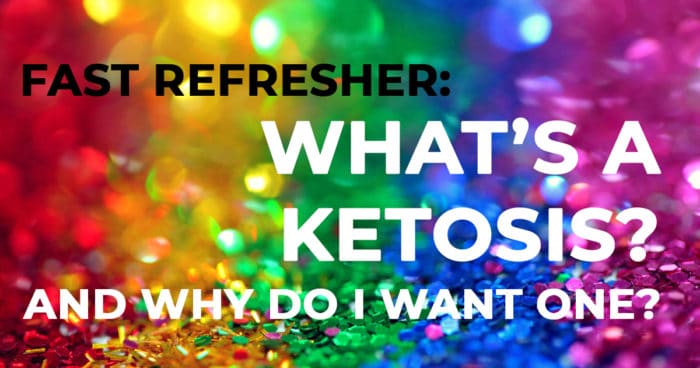
Quick Refresher: What is Ketosis?
You probably already know that keto means eating low carb. You may have the misconception that it means eating a lot of bacon, egg and cheese. While limiting your diet to just protein and fat will get you into ketosis, it’s certainly not the only way — or even a very good way — of going about it.
Ketosis is a state in which your body burns ketones (made from fat) instead of glucose (sugar) for energy.
We know that cancer prefers glucose and, generally, can’t metabolize ketones. Being in ketosis therefore means cancer doesn’t have the energy to grow but your healthy cells have everything they need.
Better yet, ketones have been shown to be protective of healthy cells while having anti-cancer properties. When you remove the glucose sources from your diet, your body will start creating ketones from your stored body fat and dietary fat to fuel your muscles and brain. Over time, your body will start to metabolize fatty acids directly and fat will become the preferred fuel source. This is what the keto community calls “fat adapted.”
This is just the highest-level layman overview of ketosis and keto for cancer. There are more articles on this blog that dive into the science more deeply or, better yet, Miriam Kalamian’s actually wrote the book on Keto for Cancer which I highly recommend.
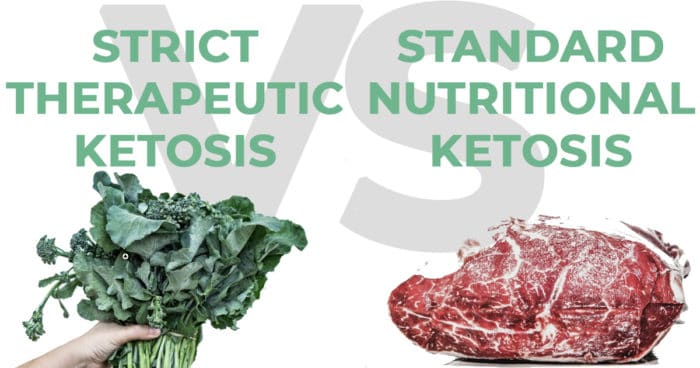
Strict Therapeutic Ketosis vs Standard Nutritional Ketosis
The difference between “therapeutic ketosis” and “nutritional ketosis” — often differentiated as “strict keto” and “standard keto” — pretty much boils down to the number of ketones floating around in your blood:
- Over 0.5 mmol of ketones per liter of blood is considered the threshold for “being in ketosis.” At this number, you know that your body doesn’t have quite enough glucose to fuel its energy needs and is now converting fat into ketones to use as energy.
- A little higher, between 1.5-3.0 ketones is considered moderate ketosis. This is the optimal zone for weight loss and other applications. For therapeutic purposes, we want to go still higher.
- 3.0 and higher is considered therapeutic ketosis although I prefer 4.0 or above.
More important than your ketone number, however, is your GKI. GKI, or Glucose-Ketone Index, is the ratio of glucose to ketones in your blood. See this article for a complete guide too GKI.
The quick summary is that, based on research from Dr. Thomas Seyfried at University of Boston, you want more ketones than glucose in your blood. This translates to a GKI less than 1.0. Note that this is extremely difficult to achieve without some fasting or strict carb and protein restriction. A GKI less than 3.0 can still be therapeutic but, overall, the lower the better.
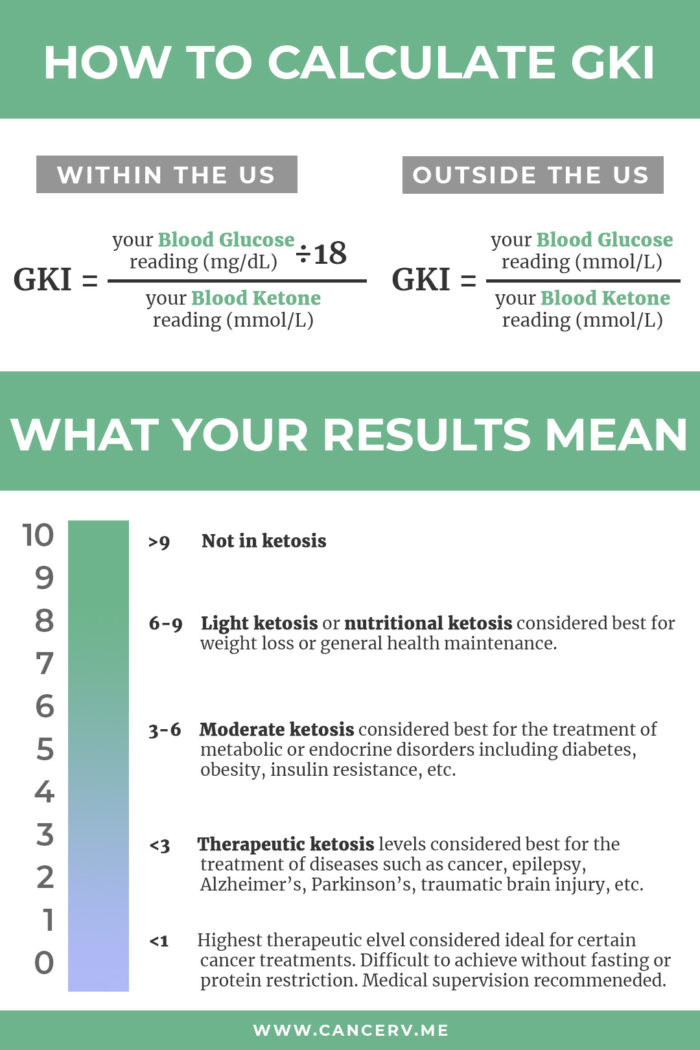
My personal approach is to fast at the beginning of the week to reset my GKI below 1.0 and then practice intermittent fasting while eating whole food, plant-based meals according to my macro limits for the rest of the week. The weekend before my next fast begins is an opportunity to indulge in healing foods that raise my GKI a bit – organic fruit, wild-caught salmon, pasture-raised egg, starchy vegetables – before I reset with the weekly fast. This approach ensures I eat a balanced, wide variety of foods, avoid feeling deprived, and keep my GKI in the therapeutic sub-1.0 range as much and as long as possible.
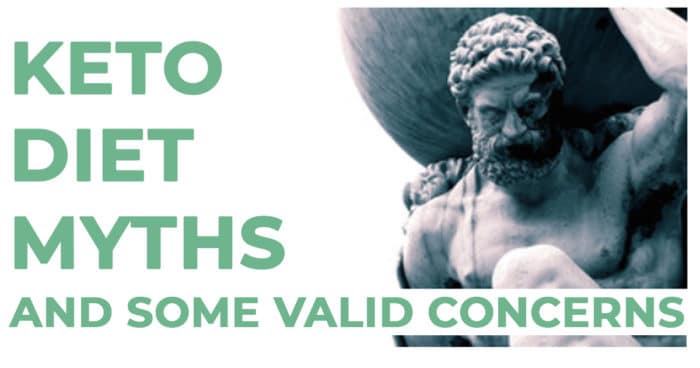
Myths and Concerns around Starting Keto for Cancer
While at its roots Keto is a medical protocol, it’s become popularized for its fast weight-loss benefits. The price of being popular is that there’s a lot of misinformation out in the interwebs.
Myth: Keto is a fad diet
The number one myth, I think, is that keto has not yet been proven as an effective therapy. It has been used by doctors to successfully treat epilepsy in children since the 1920s. On the cancer front, while the research is new the results are already overwhelming. See this article here if you want a quick summary of some of the trials. Keep in mind, too, that there aren’t any pharma dollars behind diet change.
Myth: Keto is too hard
The side effects of my drugs, radiation sickness, the post-treatment radiation necrosis in my brain, being unable to breath as I drowned in my cancerous lung fluid… these things were hard. Eating delicious, nourishing food is the opposite of that.
Sidenote: I have tremendous respect for Dr. Michael Greger but in his video reviewing keto diets he asks, “Why keto when you can chemo?” My response: “!?!?!?!?!” As someone who has done both, I much prefer eating a delicious salad to injecting myself with actual poison. Also, this study showing 60% survival with chemo only, 100% survival with chemo+keto.
While there is some work required to achieve therapeutic ketosis, hopefully this article helps simplify things a bit.
Concern: What about the keto flu?
“Keto flu” is what the internet calls symptoms like headache, bodyache, insomnia, nausea, constipation, diarrhea or other flu-like symptoms that some might experience when first transitioning from glucose to ketones.
The only time you will experience anything like “keto flu” is if you’re deeply sugar dependent (eat a lot of processed foods and sweets) AND don’t drink enough water and electrolytes during the transition.
In addition to the glucose circulating in your blood after your last meal, your body stores excess glucose in the form of glucagon in your liver and muscles. Every molecule of glucagon is bound with 3-4 molecules of water. As you adapt from a sugar-fueled, cancer-feeding machine to a fat-burning, cancer-killing one, your body will burn through these stores and release the water. That, in addition to other metabolic changes in your body, means you will be losing electrolytes.
When adapting to a keto diet, you absolutely need to drink more water and possibly supplement with potassium, sodium, and magnesium. If you find you are experiencing symptoms of dehydration or “keto flu”, drink more water and consider the snake juice recipe here.
Myth: Ketosis is dangerous
Most of the real dangers of a ketogenic diet (possible increased uric acid build-up for those who suffer kidney stones, exacerbating kidney issues due to excess protein) are only relevant for a high-protein or meat-centered diet. Therapeutic levels of ketosis require protein modulation and very few animal products which eliminates these risks. Even so, it’s important to talk with your health care team about your specific case.
Some people (tragically some doctors even) confuse dietary ketosis with diabetic ketoacidosis. The first one has been proven therapeutic for epilepsy, cancer, Alzheimer’s, Parkinson’s. traumatic brain injury and more; the second one can kill Type 1 diabetics. Ketoacidosis is when ketones are elevated AND blood glucose is also elevated. In dietary ketosis, ketones are elevated because blood glucose is low. Too low for cancer to thrive.
While Type 1 diabetics and those pursuing light, nutritional ketosis can rely on inexpensive urine strips to give an indication of their ketone levels, those pursuing therapeutic ketosis need to be able to test their blood. Which brings us to…
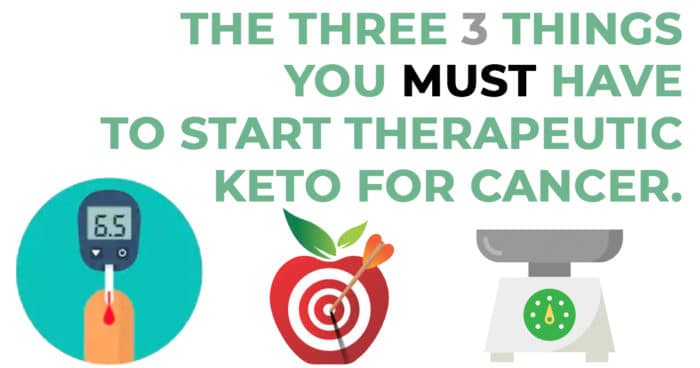
The 3 Tools You Need to Start Therapeutic Keto for Cancer
These are the three non-negotiable, must-haves to reap the full benefits of keto for cancer.
1. A blood and glucose monitor – ~$50 plus $100 in strips
I use the keto mojo and love it. There are other ketone meters out there but keep in mind that you will need both a ketone and glucose meter. The keto mojo combines both in one device although you still have to buy separate strips. I also heard that they’ll be incorporating automatic GKI calculation in a future model.
You’ll test a lot in the first month – maybe 70 times. Then once or twice a day the next few months. By month 4 you should only need to test a couple of times a week to make sure there are no surprises. By month 6, you’ll pretty much only need to test if you introduce something new.
2. A Cronometer.com account – free
You need to track everything you eat, there is no getting around that. (- Unless you’re going to follow my meal plan without variation and I wouldn’t wish that on anyone.) I’ve used food tracking apps for almost 20 years including MyPlate (I worked for the company that developed it), CalorieCount (now defunct), and MyFitnessPal. Cronometer leaves them all in the dust. It’s so much better that I left behind over a decade of tracking data to make the switch. I even pay for the advance features. But you don’t have to.
Just visit cronometer.com and sign up, then download the app for free. If you use my workflow, you’ll end up using both desktop and app versions.
And don’t worry, you won’t need to track for the rest of your life; just until you’ve become familiar with deep therapeutic ketosis and know exactly how to stay there.
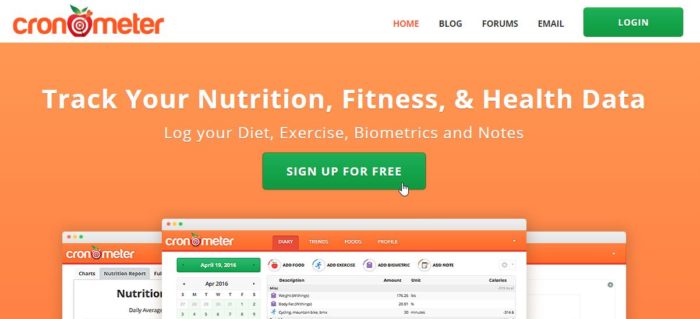
3. A food scale – ~$15
In order to accurately track your food and understand its impact on your individual metabolism, you must weigh and measure. Everything. Weighing is easier and more reliable than measuring once you have your workflow set up, below.
Like cronometer, you won’t need to do this forever. I can legit tell you right now whether those 2 Brazil nuts are 7 or 8 grams and the weight of that avocado meat within 5 grams, just by eyebballing. You get to know the foods you eat regularly pretty fast.
But you still need a scale.
Simple and cheap works great. I’ve been using one like this for 2 decades now. I’ve only had to replace it once after an accidental drowning in the dishwasher.
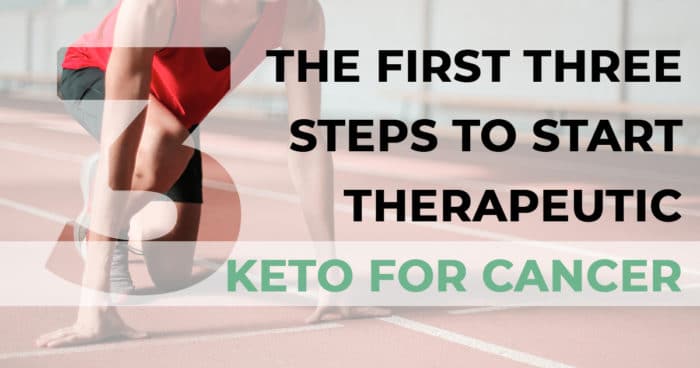
The 3 Steps to Get Started with Keto for Cancer
Once you’ve assembled these tools, follow the steps below and you’ll be ready to start within the hour.
1. Calculate your keto for cancer macros
“Macros” refers to the macronutrients fat, protein and carbohydrate. Your ketogenic diet will have different daily limits for each that you will need to follow. Every individual has different requirements but you can calculate a good general starting point based on your weight and height, then refine based on how quickly and deeply you get into ketosis.
First I talk about how to calculate macros manually and the rationale behind each. Don’t worry if this is overwhelming! It’s definitely easier to calculate these automatically in Cronometer. If you don’t want to details, feel free to jump straight to how to calculate your macros in Cronometer.
Calculate macros manually
Calculate carbohydrates
First a note that when we talk about carbohydrates, or “carbs,” we’re talking about carbs exclusive of fiber and sugar alcohols. This is the standard definition of carbohydrate used on food packaging in Europe, Australia and New Zealand. In the US, food packaging includes fiber in the carbohydrate count so, in the US, consider carbs as “net carbs” or grams of carbohydrate minus grams of fiber.
The generally accepted threshold for achieving ketosis is no more than 20g net carbohydrates, or “20 carbs” per day. However, if you are eating a truly whole food, plant-based diet you will be able to get away with more. In this case, 30g is a good starting point. You will adjust this higher or lower over time to eat as many carbs as your body can while maintaining optimal GKI. In my case, it can be as high as 40-50+.
- Carbohydrate starting limit = 30g net carbs (20 if not exclusively whole foods plant-based)
Calculate protein
Those pursuing keto for non-medical reasons like weight loss, metal clarity, or other benefits do not need to limit protein. For those pursuing the low glucose and high ketone levels therapeutic ketosis requires, protein will need to be limited. Protein beyond what your body can use immediately is converted into glucose for storage and feeding cancer cells. Too much dietary protein is the primary reason I see in people unable to achieve therapeutic ketosis.
- Protein starting limit = your lean body weight in kg x 0.8
To calculate your lean body weight, first multiply your total body weight by your percentage body fat. Then, subtract this number from your total body weight. For example, if you’r total body weight is 65kg and you have 25% body fat, your lean body weight would be 65kg – (25%x65kg) = 48.75. You would then multiply the result by 0.8 to calculate your protein limit. In this case 39g protein. This will seem low if you’re used to eating large amounts of protein but is sufficient.
Calculate fat
Your daily calories that don’t come from fiber, net carbs, or protein will be provided by fat. Delicious, healing, nutrient-rich fats. If you are underweight, this number will be considered a target that you will want to exceed. If you have excess weight, treat this as a limit.
This number is therefore based on your basal metabolic rate, or BMR. The number of calories you naturally burn in a day. To calculate BMR you can use a calculator like this. From there:
- Starting fat target = (Basal Metabolic Rate – (net carbs + protein) x 4) /9
I realize this is starting to get a bit complicated and, luckily, cronometer will actually do all the calculations for you
Calculate macros using Cronometer
If you’ve already set up a cronometer account (as you should have), all you need to know to calculate your macros is your age, weight, height, and percentage body fat. While you should ideally have your body fat tested, if you haven’t, you can search online for a “body fat percentage chart” for your gender to estimate.
Start in Cronometer by visiting “Settings” then clicking “Profile.” Enter your sex, birthday, weight, height, and body fat percentage. (Make sure to enter your personal information here, don’t copy mine.) No need to change the BMR or Activity Level dropdowns unless you have a truly active job like road paver or if you are underweight.
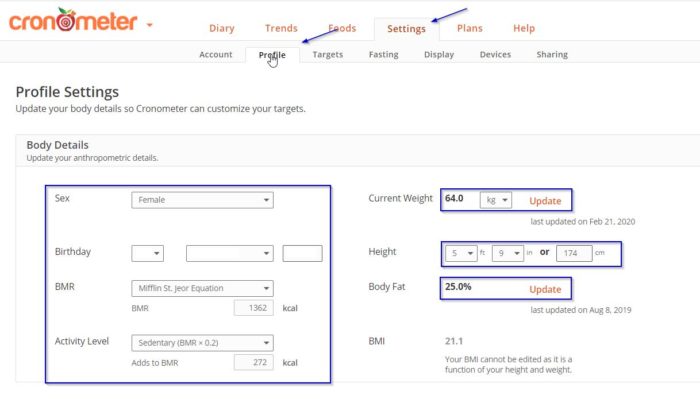
Next, click on “Targets.”
- Set “Tracking carbohydrates as” to “Net Carbs without Sugar Alcohols.”
- Set “Set marco targets using” to “Ketogenic Calculator.”
- Under the keto calculator enter the values I have here: “Custom,” “0.8” and “30” grams non-fiber carbs. (Remember, this is for whole foods, plant based keto. If you plan on eating another way, enter “20,” instead.)
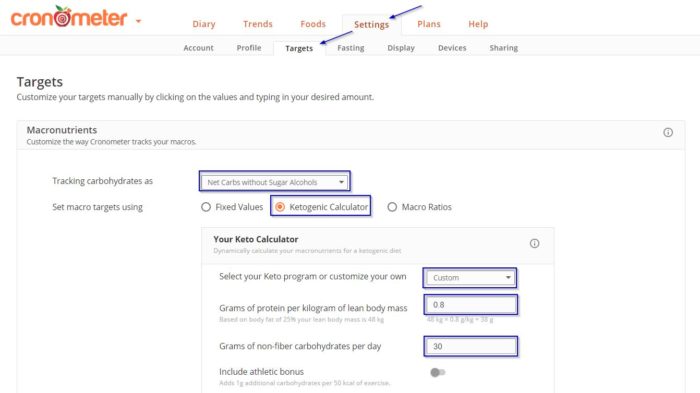
You can now find your macros at the bottom of your “Diary” page. As you log food, Cronometer will show you how close you are to hitting each macronutrient target for the day and how much of your allotment remains.
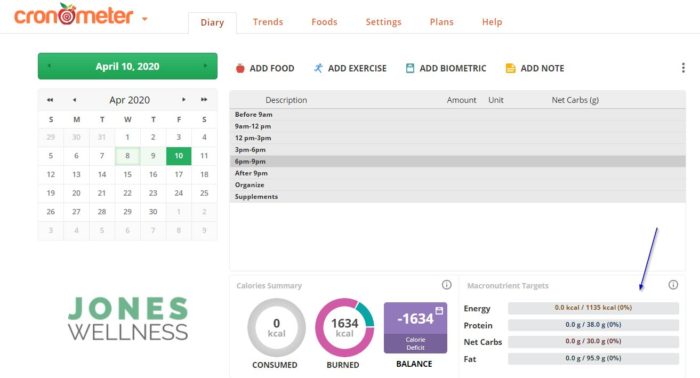
2. Establish your baseline GKI and diet
Measure your blood glucose and ketones and record your baseline GKI before starting Keto for Cancer
That means pricking your finger and following your device’s instructions to get a reading for both blood sugar and ketones. Once you have the two numbers, you can calculate yourself using the formula above and record them in a safe place, or enter them into Cronometer.
In Cronometer, click “Add Biometric”

Enter the “Ketones (Blood)” and save; then enter “Blood Glucose” and save.
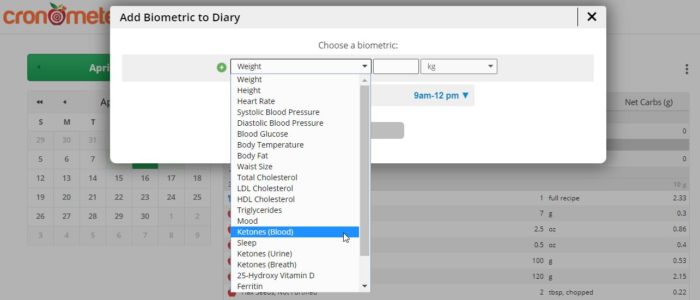
Cronometer will calculate your GKI and store it for comparison over time. You’ll want to test your GKI at the same time each day, once in the morning and once in the evening in the beginning, always at least 3 hours after eating, and record each measurement in Cronometer.
Overtime you’ll be able to generate reports to identify trends and understand your total time in the therapeutic GKI zone.
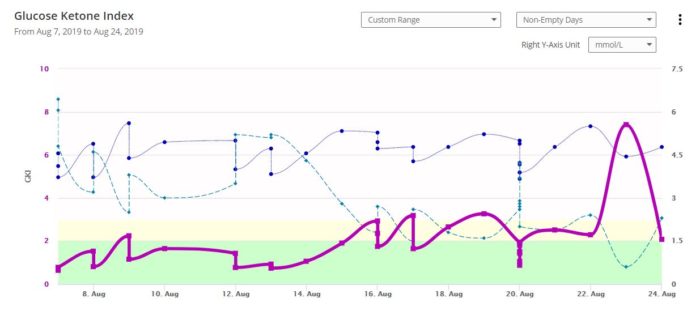
Establish your baseline diet and begin daily tracking
Using either the desktop of the app, record everything you ate yesterday in cronometer. Estimate amounts the best that you can and be honest. This information is only for you to get a feel for your eating and understand how it will change.
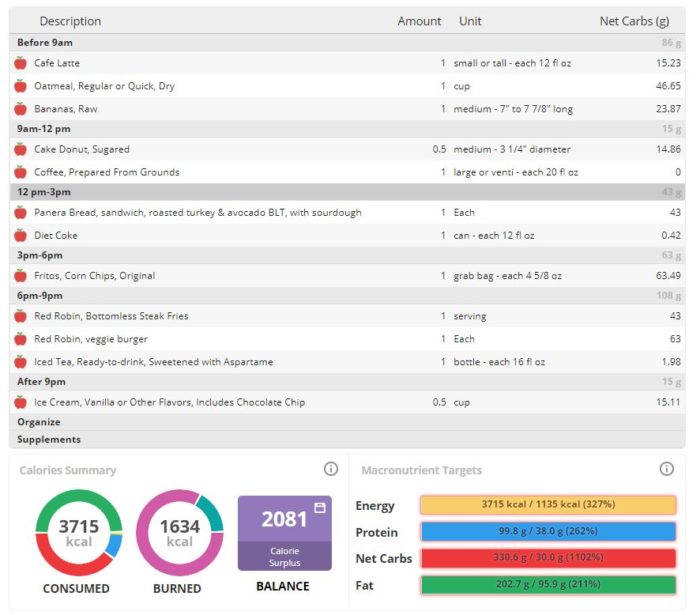
If you’ve eaten a lot of sugar or processed food, it may be slightly more difficult for you to enter ketosis but the benefits will be evident even sooner.
3. Make a list of the reasons you want to live a long, healthy life
If you haven’t already, make a written list of why you want to live: more time with Brad; seeing my niblings grow up– watching them choose careers and life partners; traveling to Morroco, Spain, Croatia, New Zealand; learning to play the accordion; outliving Brad so I could get a cat. These were just a few of the items on my list.
You may cry. You should cry. Crying is incredibly appropriate for those facing premature death; for those having to say an early goodbye to everything they love in the world.
Ask yourself seriously – if you could have all these things, but never eat another (–insert favorite food–), which would you choose? Heck, if you could have these things but never eat again, which would you choose?
This sounds a little dark but it was the mindset that kept me focused and committed to my diet in the early days. I knew that every hint of sugar or processed food I put into my body would make the cancer stronger. Trust me, nothing in the world tastes good enough that it’s worth making cancer stronger.
The reasons you have to live and be healthy will get you through this. No fleeting bite of food is worth the trade.
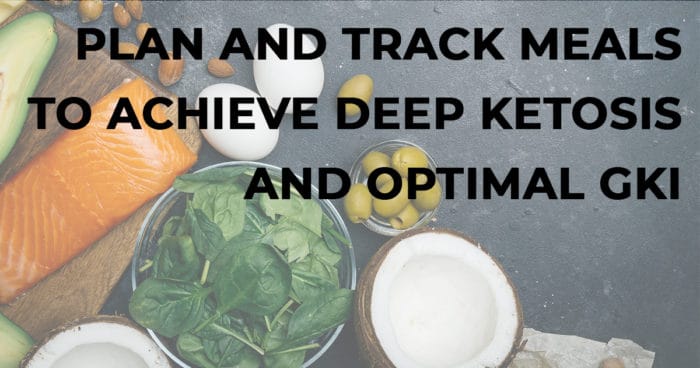
Begin Planning and Tracking your Meals and GKI to Achieve Optimal Therapeutic Ketosis
Congratulations on taking the steps you need to get started with Keto for Cancer!
Next Up:
- Workflows that Work: Planning and tracking meals and GKI for optimal therapeutic ketosis.
- What to eat on a therapeutic whole food, plant-based, ketogenic diet.


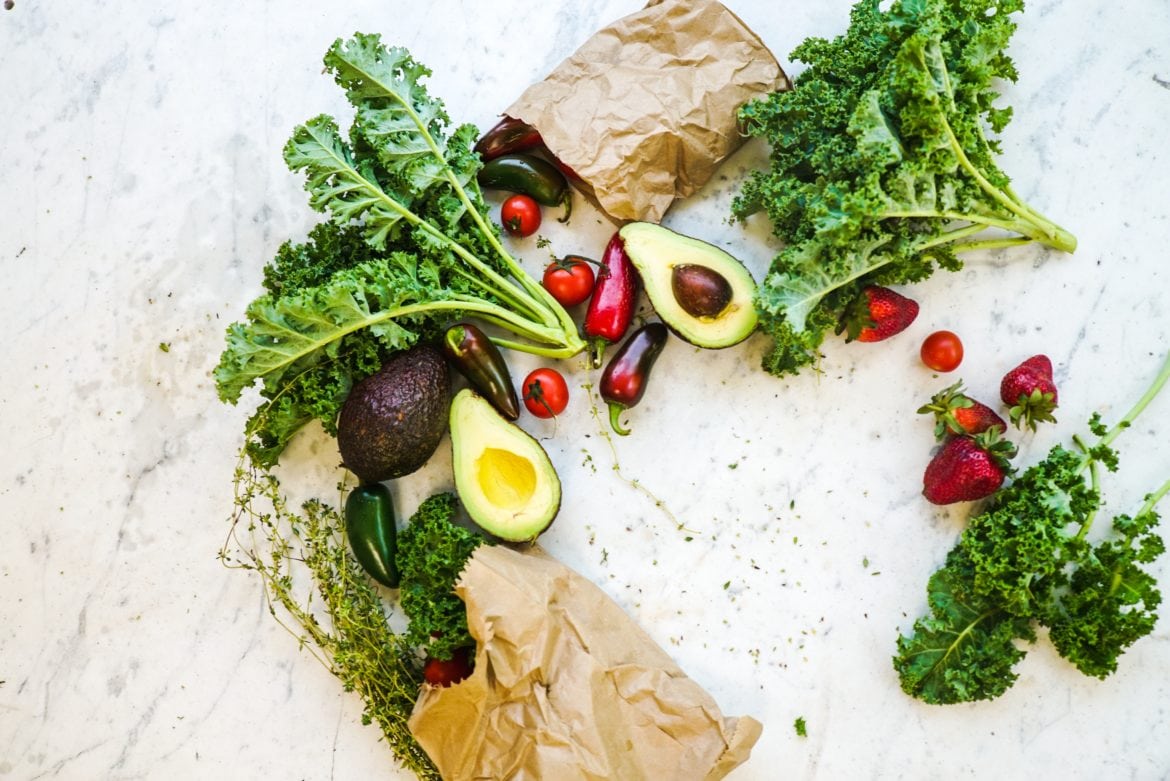
20 comments
you are so serious in this. i may need to get this serious. Jesus take the wheel.
So serious. I didn’t even cheat with an apple until I was No Evidence of Disease in October. Even now it’s whole food, plant based light keto and fasting all the time, always. I know that the crap I want to eat will just make the cancer stronger and my body weaker and I love my body too much now.
double dipping: this blog is just what I needed to read after writing my last blog 🙁
Oof! I just caught up with you. I’m so sorry for what you’re going through. You’re totally right that getting some serious ketones flowing might be exactly what you need! Protect your poor, healthy cells while sensitizing those cancer-y ones.
Most of all — THANK YOU MAGGIE! I have been looking for just exactly this in a meal plan that was plant-based. I have been getting good GKI readings, but it has included butter, cream, etc. I cannot wait for the results I need to beat type 2 diabetes. Cancer is gone, but I don’t want it to come back, so therapeutic or better level (such as you accomplish!) is where I want to be. Plus…type 2 diabetes is a situation where our brains do not work very well and I want to correct this. Intermittent Fasting is integral.
Thank you so much for the kind words! After your miraculous cancer recovery I know you will crush Type 2 diabetes!
Maggie please help I can’t get out of therapeutic ketosis and want to be in optimal.. my question is will I still lose weight in my current keto state? Even though I’m around 4.4 mmol??
Hi Rosanna! If you’re observing a keto diet for weight loss or other non-medical purposes, you shouldn’t need to keep your GKI in the therapeutic range. Note that GKI (glucose ketone index) and ketone measure are very different numbers. This article may help: https://cancerv.me/2019/10/25/the-complete-guide-to-glucose-ketone-index-gki-tracking-for-therapeutic-ketosis/ Blood ketones of 4.4 mmol/L are excellent for any keto application and usually indicate a very low GKI.
You should lose weight anytime you’re consuming fewer calories than you’re burning. With ketones as high as you report, you’ll almost certainly experience the appetite suppression and reduced inflammation benefits that make weight loss so much easier on keto.
Cheers!
Can you please share some recipes.
Hi Claudia! You can find recipes in the navigation under “Metabolic Cancer Diet > Cancer Fighting Recipes” or by clicking https://cancerv.me/category/anti-cancer-diet/cancer-fighting-recipes/
There are also many recipes in the free meal plan that is sent when you sign up for the newsletter.
Much love! Maggie
Thankyou so much! This gives me hope. I have metastatic ovarian cancer and I’ve just continued with the same bad eating habits! For 2 years! I hope it’s not too late
It is absolutely not too late an it makes a real difference! I’m actually on the road right now interviewing the scientists and practitioners researching these therapies for a documentary and I’m overwhelmed by the evidence showing how much dietary therapy can impact survival. And raging in frustration that there’s no money to get the information out there. We’re doing our best =D The documentary site is up at https://cancerevolution-movie.com/ I’m working as fast as I can to get this out by January,
Much love to you on your journey!
Hi Maggie! Holy cow am I inspired by you! I was diagnosed with stage 2 breast cancer in August 2019. It was a whirlwind of appointments, decisions, and emotions from my diagnosis on August 28th to September 6th when I had my first chemotherapy session. I had a pretty aggressive treatment plan and finished everything in October 2020. I’ve been in a kind of limbo since then -wanting to start my “forever” lifestyle, but not knowing which direction to take or how to start. There’s SO much information out there! After going through an extremely emotional year long + journey (I was diagnosed right as my youngest son was starting his senior year of high school and then still doing treatments as I took him from Alaska to Missouri for college last fall, my oldest son moving out on his own, and then add on COVID!) I’m finally letting everything sink in and processing it all. I’m still reading all of your stuff, but feel like I’ve finally found the route I need to take. I found your page on fb as well and am so excited to see it in my feed!
What you went through is incredible and sobering and inspiring. You are a walking miracle and I feel like I was meant to come across your website at exactly this moment. Thank you for sharing your story, your research and knowledge, and your love of life.
Hi Briana!
Thank you so much for reaching out! Your story is amazing and totally inspiring. What a crazy time in life!
Your concept of “forever” lifestyle is so profound and gives me goosebumps every time I think of it. My first couple of years always had hints of waiting to get better and be officially over this. I’ve only recently really settled in to the idea that there’s nothing to get past of get through – this is life. I could never have put it as clearly as you. I’d love to borrow that phrase for a future post.
I’m so happy to meet you and can’t wait to hear where your journey takes you. Thank you again for reaching out!
Maggie, thank you so much for this. My mother has liver cancer and I’m currently a student at IIN, not everyone is as keen to say how important nutrition is for EVERYONE, but cancer patients especially. I know how much this can help so I am doing everything I can to create meal plans for her and provide her with information on WHY and HOW to do it. you have made life a lot better for me. I am so grateful for this, thank you for helping me be a part of saving my mother’s life. I know she can beat this. We just need the tumors to go down in size with 2 concentrated to the liver chemo sessions and if they shrink, then I or my brother can give her my liver.
Have you heard of the company Levels? Its a CGM for non diabetics, You sign up and a doctor approves you to have one. Some people just use it for a month, but I am obsessed with blood sugar so I wear it all the time..its been such an amazing and useful tool for me. I heard about it on Kelly Leveque’s podcast and have been obsessed with it.
You have now become my nutrition coach hero! <3 Thank you from the bottom of my heart
Wow, Lacy! You are amazing! Your mother is so lucky to have you on her team. There’s no doubt in my mind she will have the best possible outcome with such fantastic support! I’m just sorry your family has to go through this.
I haven’t heard of Levels but will take a look. I was spoiled by being able to purchase a CGM in Hong Kong and the UK (Freestyle Libre) without a doctor’s approval and have been frustrated here in the US. Thank you for the recommendation!
You are my hero! So much love to you, your mother and brother!
Maggie, I am just 5 days after hearing “it”. And by having microbiology degree I got your point right away. Pulled my old books out to refresh some knowledge, but found sad sentence of yours “not for renal cancer” (its me) -why? Why? Why?
Hi Victoria, I’m so sorry to hear about your diagnosis but blown away that you’ve already found your way to metabolic therapy.
My concerns around keto for renal cancer stem from this 2018 review of keto for various cancer cell types. Of the two studies for kidney cancer analyzed, one showed severe side effects and one showed a pro-tumor effects. (Easier to see the graph here.) BIG HOWEVER, I have hear anecdotal success stories from others. Also, many of these keto diets could have been/ were likely high in protein, stressing the kidneys, unlike my way of eating. While some think keto may increase risk for those with kidney disease, that is due to the perceived protein content. A recent study has shown that low-calorie keto (thus lower protein) is safe and effective for those with mild kidney disease.
In very much a DIY kinda girl and I sense you are, too. My advice for your case, though, would be to work with a specialist with a little more medical background than my usual recommendations. Feel free to send me an email and I can send you a list of candidates – although I’m sure there are far more than I know.
Very best of luck! I know that you will soon be a success story that will help inspire others in your position. Sending love, Maggie
Maghie, found your site anx on to the diet which am finding good as was a healthy eater before diagnosis. Question would likd to ask you is during diet what type of therapy did you go thru. how long, and what were the side effects like? Don’t know anyone who has had this disease so no one to ask and quite concerned with what to expect as was totally healthy before this. Ask your oncologist anything and they just give you the norm answers which never seem to align with reality. Any feedback you can provide would be much appreciated. Thx.
Hi Dee!
You can read my story at https://cancerv.me/2020/04/12/my-story-of-healing-from-terminal-stage-4-cancer/ and updates during treatment and after at https://cancerv.me/category/my-story-of-advanced-lung-cancer-healing/general-updates/
Sending you love on your journey!